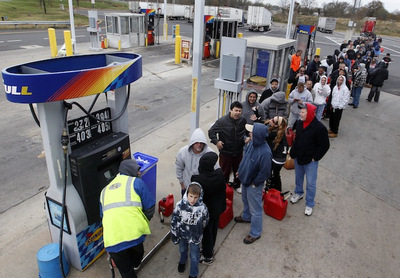Podcast: Play in new window | Download
Subscribe: RSS

Hurricane Sandy brought New Yorkers a brief taste of Apocalypse Then, but it wasn’t close to 9/5/2000.
A fascinating retrospective by Kathy McMahon, a clinical psychologist who blogs as “Dr. K., the Peak [oil] Shrink,” details the little known (in this country) and little remembered (anywhere) story of what happened when the oil supply of some industrial European countries was briefly interrupted by their own citizens. The breathtaking speed with which the grocery stores emptied, the gas stations closed and the economy flatlined are instructive, and predictive. Too bad nobody knows the story.
McMahon’s account was published seven years ago this month in her blog, Peak Oil Blues, and has just come to my attention. The story begins on September 5, 2000, when some French fishermen, distressed by the threat to their livelihoods posed by the rapidly rising cost of fuel, decided to protest by blocking the English Channel. This cut off most of the oil imports to France and England. Soon farmers and truckers, similarly threatened by the price of fuel, joined the fishermen by blockading refineries and distribution centers throughout Europe.
To the shocked surprise of all concerned — including the protesters — the governments and economies of the affected nations were sent reeling almost immediately. Perhaps the worst case was England, where, within 9 days of the first protests:
-
enormous lines appeared at gas stations as panic buying spread across the country on day 4;
-
over half of Britain’s gas stations were closed by day 6, 90% by day 9;
-
food stores experienced the same wave of panic buying, forcing supermarkets to close or impose rationing;
-
hospitals suspended all but emergency care and began to run out of blood and essential supplies;
-
mail delivery and public transportation operated on reduced schedules;
-
heavy industries — auto manufacturers, steel plants, aerospace plants and the like — began planning immediate cutbacks, layoffs and closures as they ran short of fuel, parts, raw materials and workers who could get to work.
How could it all come apart so fast? One answer [explored in detail in my book Brace for Impact] was provided at the time by London Observer columnist Will Hutton:
“What had not been appreciated was the fragility of an economy made extraordinarily interdependent because so many organisations carry astonishingly few reserves. Rather than tie up money in carrying ‘dead’ stock, supermarkets and petrol stations rely on a system of ‘just-in-time’ delivery – depending on daily and sometimes even more frequent deliveries to keep their shelves and underground tanks stocked. Fine if the lorries and tankers keep on coming. Disastrous if they don’t for two or three days.”
Reminder: all this was accomplished not by terrorist attack, not by natural disaster or the action of some “unstable regime” upon which everyone relied for oil. This was done by citizens exercising their treasured right to petition their governments for redress of grievances. Catastrophe was averted because the protesters, appalled by the harm their actions had done their countrymen, called off their protests on September 14.
It took months for the battered economies to get back to normal.
What should be a cautionary tale taught to every grade-schooler in every industrialized country has sunk into obscurity. Among its lessons, which need to be held close and acted upon today:
-
one can push one’s citizens only so close to poverty and famine before they rise up. This applies to everyone.
-
the effect of the first, least interruption of oil supply will be immediate, and will immediately metastasize in the form of panic buying, hoarding and swiftly exacerbated shortages;
-
collateral damage of the food supply will be equally devastating and immediate;
-
collapse of the entire economy is to be expected about two weeks after a substantial interruption of oil;
-
the only reason the story of 9/5/2000 does not include mass starvation is that the interruption was voluntary and reversible.
Do not expect any government of any industrialized country to recognize, let alone act upon, these graphic, undeniable lessons. Only by grasping sustainable living at its roots, and hanging on no matter what, can we who recognize the lessons, profit from them.
[A round of applause, please, stranding if you don’t mind, to Kathy McMahon for trying to keep this story alive.]
Perhaps this explains why Brits are more concerned about peak oil than about climate change. And perhaps it is why Brits are doing more work with ‘transition towns’ (local communities looking to live in a low-carbon world) than anywhere else.
From what I read, the UK currently imports around 40% of her food.
Maybe she can decrease it to 0% or at least less than 10%, which is certainly what she’s going to have to do if the majority of the Britz are to survive the oil crash.
Can she do it?
Time will tell.